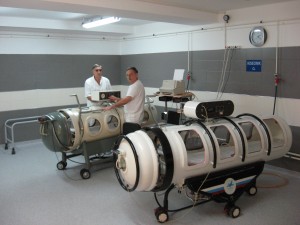 Some people believe that Hyperbaric Oxygen Therapy (HBOT) can help heal Traumatic Brain Injuries (TBI). This treatment involves a patient inside a hyperbaric chamber, which has been pressurized to greater than 1 atmosphere. The patient then inhales 100 percent oxygen, as opposed to the 21 percent we normally breathe. The chamber induces both mechanical and physiological effects. However, the length of time the individual is in the chamber, how often the treatment is given, and the number of total sessions has not been set in stone.
Some people believe that Hyperbaric Oxygen Therapy (HBOT) can help heal Traumatic Brain Injuries (TBI). This treatment involves a patient inside a hyperbaric chamber, which has been pressurized to greater than 1 atmosphere. The patient then inhales 100 percent oxygen, as opposed to the 21 percent we normally breathe. The chamber induces both mechanical and physiological effects. However, the length of time the individual is in the chamber, how often the treatment is given, and the number of total sessions has not been set in stone.
Brain injury can be caused by traumatic physical force, bleeding inside or around the brain, rapid movement of the head, lack of oxygen to the brain, or even toxic substances that pass through the blood-brain barrier. Individuals who experience a traumatic brain injury may suffer from temporary or even permanent impairment of cognitive, emotional, and/or physical functioning.
How It Works
In a normal individual outside an HBOT chamber, oxygen is only carried by red blood cells. When the patient is inside the chamber, however, the oxygen is delivered to all areas of the human body, especially those that are in need of extra oxygen. The treatment helps white blood cells fight bacteria. It also allows new blood vessels to grow in areas that were affected by injury more efficiently, as it helps reduce the swelling of the surrounding tissues.
A traumatic brain injury leads to permanently and irreversibly damaged tissue. However, there may be some tissues that have just been deadened and may need to be revived. By allowing an increased flow of oxygen to these tissues, it was believed that the tissues could be healed again, and the body’s normal functions and activity could be restored. Unfortunately, no studies have been able to show significant evidence to verify these theories.
Effects
One study showed that HBOT might reduce mortality or the duration of a coma in severely injured traumatic brain injury patients. However, the research from this trial also showed that HBOT increased the chance of a poor functional outcome. A second study found no difference in mortality overall, but a significant reduction in mortality in one subgroup. Because of the varied findings, researchers concluded there was insufficient evidence to determine if the treatment actually helped patients.
The Cochrane Collaboration consists of statisticians who analyze and weigh the pros and cons of different forms of therapy. They concluded that while HBOT may increase survival rates in traumatic brain injury patients, the therapy does not help or improve neurological function. However, a new clinical trial is scheduled to start in January 2011 and will again attempt to provide more solid answers to the questions being asked about this therapy and treatment.
Contact Us
Have you suffered from a traumatic brain injury or you know of someone who has? If so, contact our office. Our attorneys are caring and experienced in all traumatic brain injury cases and will provide you with a free consultation. Should you decide to pursue a claim, we will ensure that you are fully compensated for your medical bills and loss of income, as well as pain and suffering.



I have a 21mo. old grandson who is in a”permanent vegetative state” due to a near drowning.
I would like to know if you have treated patients such as this with HBOT and what, if any, the results have been.
thank you
john kastner
hello,
My wife got serious brain injuries after accident, doctor removed two bones of skull in the triangle shape, they said the swelled brain required more spce, the afterwards when swelling is removed & the patient comes out of trauma then they will again fix these bone.
She is not concious from last 17 days, now she is moving her head little bit and doing some facial expression, thats it. She not opened the eyes eve. Doctors said that we should go for the HBOT process, in that process patient comes out from trauma and regain it conciousness. Doctors says most of the accident cases heals during this process.
Pls provide me the proper guidance regarding my patitent.
Thanx.